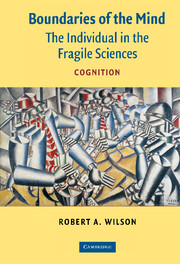Book contents
- Frontmatter
- Contents
- List of Tables and Figures
- Acknowledgments
- Boundaries of the Mind
- PART ONE DISCIPLINING THE INDIVIDUAL AND THE MIND
- PART TWO INDIVIDUALISM AND EXTERNALISM IN THE PHILOSOPHY OF MIND AND THE COGNITIVE SCIENCES
- PART THREE THINKING THROUGH AND BEYOND THE BODY
- PART FOUR THE COGNITIVE METAPHOR IN THE BIOLOGICAL AND SOCIAL SCIENCES
- 11 Group Minds in Historical Perspective
- 12 The Group Mind Hypothesis in Contemporary Biology and Social Science
- Notes
- References
- Index
12 - The Group Mind Hypothesis in Contemporary Biology and Social Science
Published online by Cambridge University Press: 02 December 2009
- Frontmatter
- Contents
- List of Tables and Figures
- Acknowledgments
- Boundaries of the Mind
- PART ONE DISCIPLINING THE INDIVIDUAL AND THE MIND
- PART TWO INDIVIDUALISM AND EXTERNALISM IN THE PHILOSOPHY OF MIND AND THE COGNITIVE SCIENCES
- PART THREE THINKING THROUGH AND BEYOND THE BODY
- PART FOUR THE COGNITIVE METAPHOR IN THE BIOLOGICAL AND SOCIAL SCIENCES
- 11 Group Minds in Historical Perspective
- 12 The Group Mind Hypothesis in Contemporary Biology and Social Science
- Notes
- References
- Index
Summary
REVIVING THE GROUP MIND
In the previous chapter, I suggested that the group mind hypothesis could be understood either literally or metaphorically. Expressions of the group mind hypothesis, both in the collective psychology and superorganism traditions and in contemporary discussions, often lend themselves to the literalist interpretation, although I argued in the previous chapter that in fact many of these are better understood as somewhat confusing attempts to state a version of the social manifestation thesis. I shall begin by briefly looking at contemporary views that appear to express the group mind hypothesis, and then raise questions about how they are best understood, and what notion of mind they draw on.
David Sloan Wilson has been a key advocate of the group mind hypothesis in thebiological sciences, casting his advocacy in terms of the notion of cognitive adaptations and locating it within his broader defense of group selection and group-level adaptations. Group-level adaptations are species-specific phenotypes, including behaviors, that evolved because they conferred a selective advantage on their bearers, that is, on the groups of organisms that have them. In extending the notion of a group-level adaptation to cognitive phenotypes, Wilson says,
Group-level adaptations are usually studied in the context of physical activities such as resource utilization, predator defense, and so on. However, groups can also evolve into adaptive units with respect to cognitive activities such as decision making, memory, and learning. As one example, decision making is a process that involves identifying a problem, imagining a number of alternative solutions, evaluating the alternatives, and making the final decision on how to behave.[…]
- Type
- Chapter
- Information
- Boundaries of the MindThe Individual in the Fragile Sciences - Cognition, pp. 286 - 308Publisher: Cambridge University PressPrint publication year: 2004



